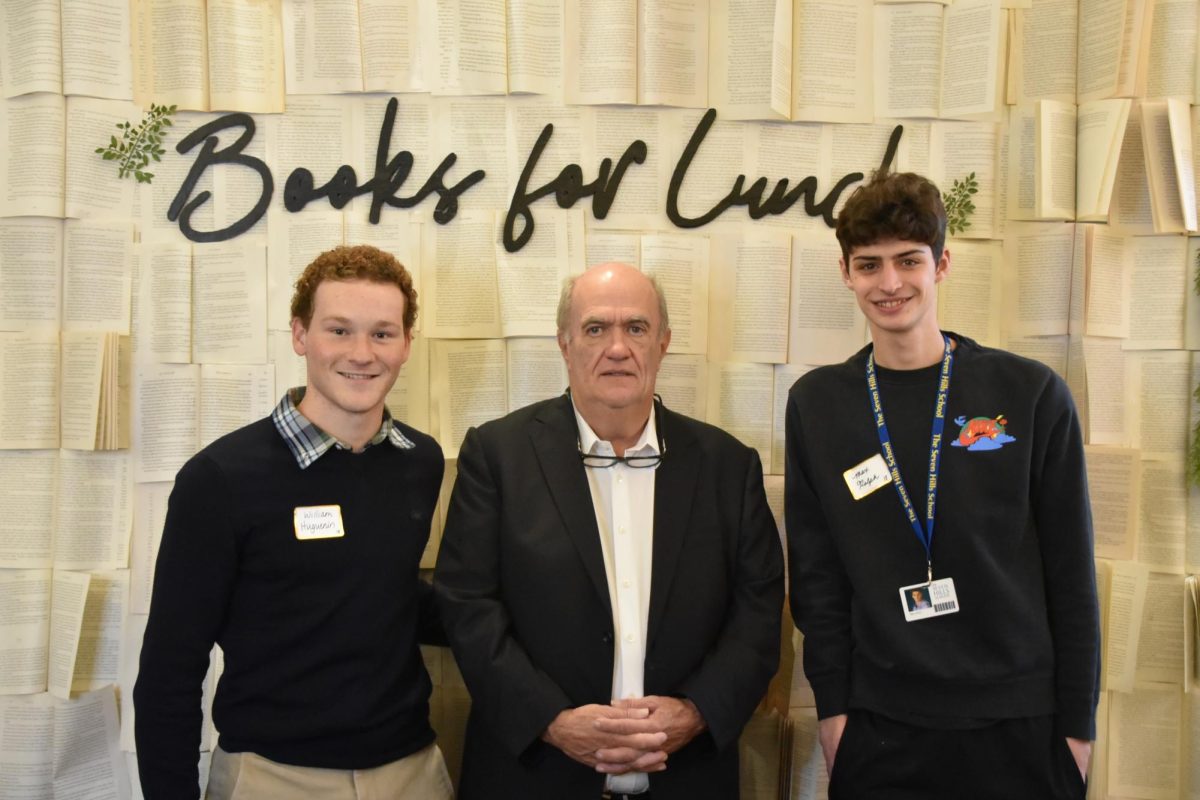
On February 7th, highly acclaimed author Colm Tóibín visited Seven Hills as the 2025 Books for Lunch speaker. The day was filled with several opportunities for students, faculty, parents, and many other members of the Seven Hills community to connect with Tóibín. In the morning, all Upper School students attended Tóibín’s lecture in the Schiff Center. Shortly after, students were invited to meet with and ask Tóibín questions in the library. In the afternoon, Seven Hills hosted the annual Books for Lunch Luncheon for members of the Seven Hills parent and alumni communities. Fortunately, I was able to attend all three events to hear about Tóibín’s literary journey and career.
Prior to Tóibín’s visit, the English Department prepared the student body for the day by introducing some of Tóibín’s works. Students read Tóibín’s recent recount of the LA Wildfires and A Journey, one of his short stories. “I chose the article Tóibín wrote about the California wildfires because I wanted my students to read something in its entirety,” Upper School English teacher Nate Gleiner said. “We talked about the major themes and construction of the article, which I hope gave my students a better understanding of his work.”
At the luncheon, Tóibín was asked what he thought about writing stories from the perspectives of people different from himself. Many of Tóibín’s novels feature main characters who are women, and he mentioned that in the past he has had friends tell him his stories “are not his to tell.” Tóibín pushed back at these accusations and inspired the audience to “always tell stories that you think are worth telling, even if they aren’t yours.” When asked what he found most inspiring about Tóibín’s talk, Gleiner said, “he mentioned that when he writes stories from a different perspective, he still draws on his experiences with the people in his family, his friends, and his Irish heritage. To me, the idea of writing outside of experience is so intimidating, so I found that inspiring.”
Throughout the day, Tóibín provided insight into his literary career and gave several pieces of advice for those interested in writing. He shared that several of his novels contain stories based on his life experiences. His 2014 novel Nora Webster tells the story of a widowed mother of four who struggles to take care of her family and remake her life in Enniscorthy, Ireland. At age 12, Tóibín’s father died, and he shared that writing the novel allowed him to reflect on what his mother may have gone through.
Upper School English Teacher Tricia Hoar shared that Nora Webster was her favorite novel as it gave insight on what her mother may have gone through after the passing of her father at a young age. “I think that perspective matters,” Hoar said. “He was able to put himself into his mother’s shoes and feel the grief, but also feel the need to carry on because she had children looking to her for guidance and sustenance. For me, it measured in so many ways with what I thought my mother was going through.”
Tóibín spoke of many instances where his literary career has led to funny interactions with readers. Shortly after his 2009 novel Brooklyn was published, he met the daughter of the woman who inspired the novel’s main character. When Tóibín’s father died, many friends came to visit his mother, and he shared that they frequently gossiped together. One day after a visitor left the house, his mother began to talk about the visitor’s daughter who had left Enniscorthy to go to the United States. This story influenced his 2009 novel Brooklyn. Shortly after the novel was published, he met the daughter of the woman who inspired the novel’s main character.
“My favorite part was when he talked about the Oscars,” said Junior Lemuel Zion. Tóibín shared that he was invited to the Oscars for his work that was being made into a film. However, he did not describe the experience as the grand celebrity fest that we know it to be. Tóibín was separated by a curtain from all the famous superstar actors. “If I reached my hand over the curtain, I would have touched Chris Pratt’s head,” Toibin said. “Unfortunately, the novelists were away from the cameras in the back of the room.”
Tóibín also shared that some of his novels have movies. However, he joked that sometimes he was disappointed with the inaccuracies of the movies. He said that in the Brooklyn Movie, people were awake, showered, and happy at five in the morning getting ready for work. “Nobody in Enniscorthy would ever be both clean and joyful at five in the morning,” said Tóibín.
Colm Tóibín’s visit to Seven Hills was a profound exploration of storytelling, identity, and the human experience. Through his engaging lectures and personal anecdotes, Tóibín inspired students, faculty, and parents alike to embrace the complexities of writing and the importance of sharing diverse narratives. His encouragement to “always tell stories that you think are worth telling” resonated deeply, offering a powerful reminder of the value of empathy and connection in literature. As the Seven Hills community reflects on Tóibín’s insights, it is clear that his visit has ignited a passion for writing and storytelling among attendees.